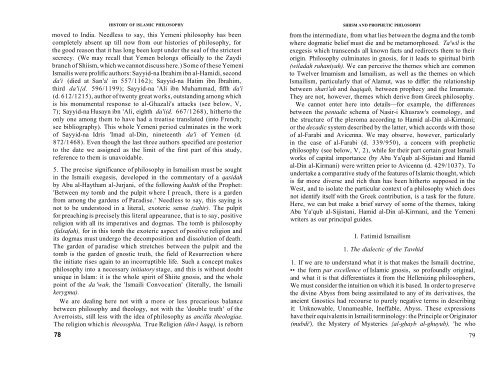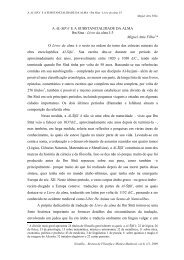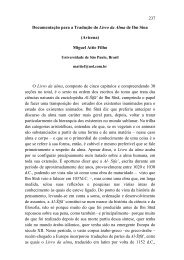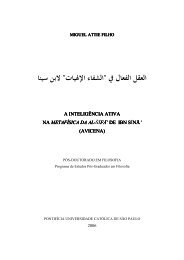History Of Islamic Philosophy - Henry Corbin.pdf - Falsafa
History Of Islamic Philosophy - Henry Corbin.pdf - Falsafa
History Of Islamic Philosophy - Henry Corbin.pdf - Falsafa
Create successful ePaper yourself
Turn your PDF publications into a flip-book with our unique Google optimized e-Paper software.
HISTORY OF ISLAMIC PHILOSOPHY<br />
moved to India. Needless to say, this Yemeni philosophy has been<br />
completely absent up till now from our histories of philosophy, for<br />
the good reason that it has long been kept under the seal of the strictest<br />
secrecy. (We may recall that Yemen belongs officially to the Zaydi<br />
branch of Shiism, which we cannot discuss here.) Some of these Yemeni<br />
Ismailis were prolific authors: Sayyid-na Ibrahim ibn al-Hamidi, second<br />
da'i (died at San'a' in 557/1162); Sayyid-na Hatim ibn Ibrahim,<br />
third da'i{d. 596/1199); Sayyid-na 'Ali ibn Muhammad, fifth da'i<br />
(d. 612/1215), author of twenty great works, outstanding among which<br />
is his monumental response to al-Ghazali's attacks (see below, V,<br />
7); Sayyid-na Husayn ibn 'Ali, eighth da'i(d. 667/1268), hitherto the<br />
only one among them to have had a treatise translated (into French;<br />
see bibliography). This whole Yemeni period culminates in the work<br />
of Sayyid-na Idris 'Imad al-Din, nineteenth da'i of Yemen (d.<br />
872/1468). Even though the last three authors specified are posterior<br />
to the date we assigned as the limit of the first part of this study,<br />
reference to them is unavoidable.<br />
5. The precise significance of philosophy in Ismailism must be sought<br />
in the Ismaili exegesis, developed in the commentary of a qasidah<br />
by Abu al-Haytham al-Jurjani, of the following hadith of the Prophet:<br />
'Between my tomb and the pulpit where I preach, there is a garden<br />
from among the gardens of Paradise.' Needless to say, this saying is<br />
not to be understood in a literal, exoteric sense (zahir). The pulpit<br />
for preaching is precisely this literal appearance, that is to say, positive<br />
religion with all its imperatives and dogmas. The tomb is philosophy<br />
(falsafah), for in this tomb the exoteric aspect of positive religion and<br />
its dogmas must undergo the decomposition and dissolution of death.<br />
The garden of paradise which stretches between the pulpit and the<br />
tomb is the garden of gnostic truth, the field of Resurrection where<br />
the initiate rises again to an incorruptible life. Such a concept makes<br />
philosophy into a necessary initiatory stage, and this is without doubt<br />
unique in Islam: it is the whole spirit of Shiite gnosis, and the whole<br />
point of the da 'wah, the 'Ismaili Convocation' (literally, the Ismaili<br />
kerygma).<br />
We are dealing here not with a more or less precarious balance<br />
between philosophy and theology, not with the 'double truth' of the<br />
Averroists, still less with the idea of philosophy as ancilla theologiae.<br />
The religion which is theosophia, True Religion (din-i haqq), is reborn<br />
78<br />
SHIISM AND PROPHETIC PHILOSOPHY<br />
from the intermediate, from what lies between the dogma and the tomb<br />
where dogmatic belief must die and be metamorphosed. Ta'wil is the<br />
exegesis which transcends all known facts and redirects them to their<br />
origin. <strong>Philosophy</strong> culminates in gnosis, for it leads to spiritual birth<br />
(wiladah ruhaniyah). We can perceive the themes which are common<br />
to Twelver Imamism and Ismailism, as well as the themes on which<br />
Ismailism, particularly that of Alamut, was to differ: the relationship<br />
between shari'ah and haqiqah, between prophecy and the Imamate.<br />
They are not, however, themes which derive from Greek philosophy.<br />
We cannot enter here into details—for example, the differences<br />
between the pentadic schema of Nasir-i Khusraw's cosmology, and<br />
the structure of the pleroma according to Hamid al-Din al-Kirmani;<br />
or the decadic system described by the latter, which accords with those<br />
of al-Farabi and Avicenna. We may observe, however, particularly<br />
in the case of al-Farabi (d. 339/950), a concern with prophetic<br />
philosophy (see below, V, 2), while for their part certain great Ismaili<br />
works of capital importance (by Abu Ya'qub al-Sijistani and Hamid<br />
al-Din al-Kirmani) were written prior to Avicenna (d. 429/1037). To<br />
undertake a comparative study of the features of <strong>Islamic</strong> thought, which<br />
is far more diverse and rich than has been hitherto supposed in the<br />
West, and to isolate the particular context of a philosophy which does<br />
not identify itself with the Greek contribution, is a task for the future.<br />
Here, we can but make a brief survey of some of the themes, taking<br />
Abu Ya'qub al-Sijistani, Hamid al-Din al-Kirmani, and the Yemeni<br />
writers as our principal guides.<br />
I. Fatimid Ismailism<br />
1. The dialectic of the Tawhid<br />
1. If we are to understand what it is that makes the Ismaili doctrine,<br />
•• the form par excellence of <strong>Islamic</strong> gnosis, so profoundly original,<br />
and what it is that differentiates it from the Hellenizing philosophers,<br />
We must consider the intuition on which it is based. In order to preserve<br />
the divine Abyss from being assimilated to any of its derivatives, the<br />
ancient Gnostics had recourse to purely negative terms in describing<br />
it: Unknowable, Unnameable, Ineffable, Abyss. These expressions<br />
have their equivalents in Ismaili terminology: the Principle or Originator<br />
(mubdi'), the Mystery of Mysteries {al-ghayb al-ghuyub), 'he who<br />
79







